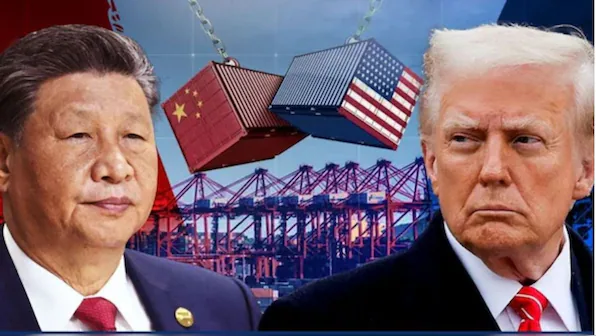China has officially retaliated against the United States’ tariffs with a major move: a 34% tax on all U.S. imports, escalating the already tense trade war between the two economic giants. The move, set to take effect on April 10, marks a dramatic shift in the ongoing trade conflict that has been shaking global markets, industries, and international relations.
China’s Bold Response: Trade War Intensifies
China’s latest tariff announcement has intensified the global trade war sparked by President Donald Trump’s decision to impose heavy tariffs on Chinese goods. In addition to the 34% tariffs, Beijing has confirmed that it will file a complaint with the World Trade Organization (WTO) in an effort to challenge the legality of the U.S. tariffs.
As part of its strategy, China will also impose export controls on rare earth elements—vital components used in consumer electronics, medical technologies, and other high-tech industries. These elements are indispensable in the production of products such as smartphones, laptops, and medical devices, making China’s actions a significant blow to industries around the world.
The Impact on Global Markets: A Financial Bloodbath
Global financial markets are already reeling from the news. On April 4, 2025, stock markets in Europe and Asia took a heavy hit, with the German DAX index falling by 5%, France’s CAC 40 shedding over 4%, and the UK’s FTSE 100 down nearly 4%. In Asia, Japan’s Nikkei index closed 2.8% lower. Meanwhile, the U.S. stock market saw its steepest decline since the COVID-19 pandemic, with the S&P 500 down by 4.2%.
The market turmoil reflects deepening concerns over the long-term impact of the trade war. Analysts are warning that the escalating tariffs could push the global economy into a recession. The situation is exacerbated by fears of disrupted supply chains, rising costs, and increased geopolitical instability.
EU’s Potential Response: Retaliatory Tariffs and Tax Measures
The European Union, which has been directly impacted by U.S. tariffs, is preparing to take action. EU officials have indicated that they could impose retaliatory measures, including taxes on U.S. tech giants. This move could further strain U.S.-EU relations, which have already been tested by Trump’s policies.
Maros Sefcovic, the EU’s trade commissioner, has stated that the EU will act “in a calm, carefully phased, unified way” to address the trade issues with the U.S. However, he also warned that the bloc would not “stand idly by” if a fair deal cannot be reached. The EU is ready to deploy countermeasures if necessary to protect its economic interests.
The Shift in Global Supply Chains: Major Companies Adjust
The new tariffs are already having a noticeable impact on global businesses, particularly in the automotive and technology sectors. Major automakers such as Stellantis, the parent company of Jeep and Chrysler, have paused production at some of their North American plants, while Nissan has revised its production plans in the U.S. Additionally, Volvo Cars, owned by China’s Geely, has stated that it will ramp up production in the U.S. to avoid tariffs on foreign-made cars.
These moves signal a significant shift in global supply chains, as companies attempt to adapt to the changing trade environment. The uncertainty brought about by these tariffs is forcing companies to rethink their manufacturing strategies, often shifting production to avoid high taxes on imports.
Political Reactions: U.S. Allies and Domestic Criticism
While President Trump has maintained a defiant stance, insisting that the tariffs will ultimately benefit the U.S. economy by reducing foreign dependency and boosting domestic manufacturing, his policies have sparked significant backlash both internationally and at home.
In the U.S., even some Republican figures, including Senate Majority Leader Mitch McConnell, have criticized the tariffs, calling them “bad policy” and urging for a more cooperative approach to international trade. Overseas, Japan has expressed alarm over the 24% tariff imposed on its goods, with Prime Minister Shigeru Ishiba labeling the tariffs a “national crisis” and urging for diplomatic talks.
The Path Forward: Will Global Trade Be Reshaped?
As the global economy grapples with the effects of the trade war, all eyes are on the U.S. and China to see how they will proceed. The 34% tariff imposed by China on U.S. goods is the latest escalation in what is already one of the most consequential trade disputes in modern history. If these tensions continue to escalate, the repercussions could extend far beyond the U.S. and China, affecting global trade and economic stability.
The WTO has already warned that the situation could lead to a 1% contraction in global merchandise trade volumes in 2025, an alarming prediction that underscores the scale of the potential economic downturn.
A Critical Turning Point for Global Trade
The imposition of a 34% tariff by China marks a critical turning point in the U.S.-China trade war, signaling that the conflict is far from over. As market turmoil deepens, global businesses are forced to navigate an increasingly volatile landscape. For now, the global economy must brace itself for the full impact of these tariffs, with governments, industries, and consumers all feeling the strain.
The future of global trade hinges on how these two economic superpowers, along with other nations, choose to engage with one another in the coming months. As this trade war unfolds, it will not only reshape the U.S.-China relationship but also have lasting effects on the global economic system.
Related stories:
Trump’s New Tariff War: Which Countries Are Hit, Who Escapes, and How It’s Backfiring on the U.S
Trump Signs Executive Order to Dismantle U.S. Department of Education
Trump Administration Bans Hundreds of Diversity and Inclusion Terms from Federal Records
















